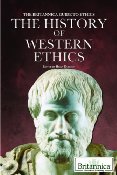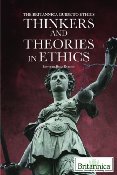
The History of Western Ethics; Thinkers and Theories in Ethics produced by Britannica
The two volume set, Britannica Guide to Ethics: The History of Western Ethics and Thinkers and Theories in Ethics, only partially delivers on the promise of the title.
The problem is that the authors attempt to do double duty, first to provide surveys of the history of Western ethics and thinkers and second to satisfy prevailing trends in education.
 Page one of the introduction to the first volume discusses Down syndrome babies to exemplify the moral dilemma of abortion. This problem-centered approach to history is beloved by educators and also serves to launch a discourse on ethical relativism and its place within Western ethical thinking. Why this particular topic is given such a prominent position is otherwise difficult to fathom
Page one of the introduction to the first volume discusses Down syndrome babies to exemplify the moral dilemma of abortion. This problem-centered approach to history is beloved by educators and also serves to launch a discourse on ethical relativism and its place within Western ethical thinking. Why this particular topic is given such a prominent position is otherwise difficult to fathom
On page 6, under the heading “Prehuman Ethics,†the author discusses the origins of morality.
Because living in social groups is a characteristic that humans share with many other animal species—including their closest relatives, the apes—presumably the common ancestor of humans and apes also lived in social groups. Here, then, in the social behavior of nonhuman animals and in the theory of evolution that explains such behavior may be found the origins of human morality.
If, as scientists tell us, humans and animals differ because the former has the ability to think rationally and the latter does not, â€prehuman ethics†is a bridge too far and an oxymoron.
The history of Western ethics encompasses what James W. Ceaser in Designing a Polity (reviewed here) called “the biblical regions, classical philosophy and the Modern Enlightenment.†It would seem to be worthwhile if the authors had noted, in the course of their chronological account, that the American Founders were not only part of the History of Western Ethics, they contributed to it. Yet, if this book includes a connection to the American experiment, I missed it.
The eight pages devoted to the philosophical history of India and China (a bow to multiculturalism?) might have been better reserved for Montesquieu and Locke who are both relegated almost to footnote status.
The last chapter, under the heading of Applied Ethics, covers feminism, animal rights, and environmentalism, among other trendy topics, along with a discussion of technological developments that present new and evolving ethical challenges.
 The other book in the series, Thinkers and Theories in Ethics, does a better job of connecting with the Founders. Locke is discussed in far more detail, as is his contribution to the framing of the Constitution (although Montesquieu is ignored). Hegel doesn’t even get a mention in this book, although modern progressivism derives in part from his theories.
The other book in the series, Thinkers and Theories in Ethics, does a better job of connecting with the Founders. Locke is discussed in far more detail, as is his contribution to the framing of the Constitution (although Montesquieu is ignored). Hegel doesn’t even get a mention in this book, although modern progressivism derives in part from his theories.
Finally, this volume also ends with discussions of animal rights, the development of vegetarianism, and environmental ethics among other topics du jour as well as discussions of the broader issues and challenges of bioethics.
At a time when, according to a study conducted by the National Association of Scholars, (The Vanishing West 1964 -2010) colleges have mostly abandoned courses in the history of Western Civilization, students need to understand that they are, to borrow a quote attributed to Sir Isaac Newton,  “standing on the shoulders of giants.â€
However, this reviewer may be asking too much of Britannica. To conclude, as these books do not, that nations that subscribe to Western ethics, are free, prosperous and protective of human life, would violate current educational demands for political correctness and multiculturalism, not to mention seriously restrict book sales. In that case, the publisher has my gratitude for books that provide a great deal more than high school students are likely to learn in college.
 The posts are coming!
The posts are coming!

2 comments
I am looking all over your site for the “like” button for Facebook.
Facebook has taken over the world….do you have a like button?
[Reply]
Martin Reply:
November 24th, 2011 at 2:13 pm
Ok, Ashe, just for you, I have put back the Facebook LIKE function. Thank you for asking. I hope you have a great Thanskgiving.
[Reply]
Leave a Comment